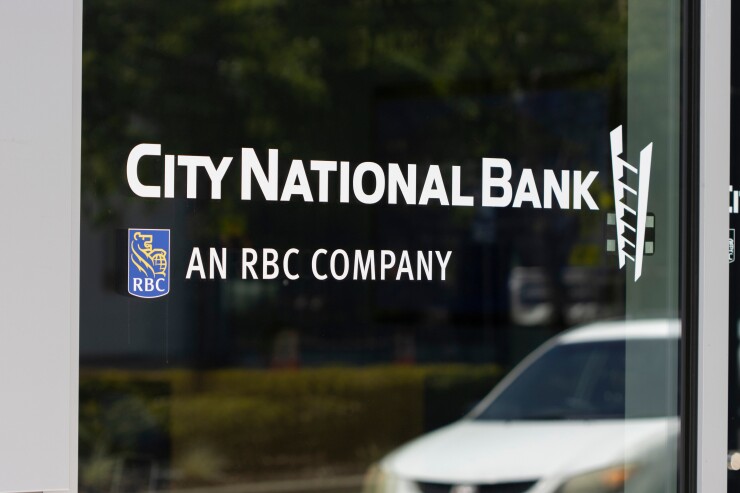
After City National Bank reported a $38 million quarterly loss on Thursday, executives at the Los Angeles bank's Canadian parent company faced tough questions about what's needed to engineer a turnaround.
City National, which was acquired by Royal Bank of Canada in 2015, is facing some of the same challenges as other U.S. regional banks, RBC CEO Dave McKay said.
Those headwinds include higher funding costs as a result of soaring interest rates, as well as pressure to reduce lending capacity as a means of conserving capital and liquidity, McKay said during the bank's third-quarter earnings call.
But unlike City National, most U.S. regional banks remained profitable in the first full quarter since the collapses of Silicon Valley Bank and Signature Bank this spring.
City National, which was long known as the "bank to the stars" due to its close ties to the entertainment industry, continues to focus more on wealth management than many other U.S. regionals. And
On Thursday, McKay was grilled about whether the company's response to City National's recent financial struggles has been aggressive enough. Toronto-based RBC said that the number of full-time equivalent employees across the entire firm fell by 1% between May and July, and it expects an additional reduction of 1%-2% next quarter.
"When you look at City National, the business isn't profitable anymore," Mario Mendonca, an analyst at TD Securities, said during RBC's earnings call. "I mean, a business you paid over $5 billion for in 2015 didn't make any money this quarter."
He described the staffing cuts that RBC disclosed on Thursday as "incremental" and asked whether bigger expense reductions are in the works.
In response, McKay said that the staffing cuts are part of a more ambitious expense-reduction program that RBC executives will be discussing more over the coming quarter.
He also said that City National's performance has taken a "drastic" turn since the U.S. banking crisis in the spring. "This business is well below our expectations for this year," McKay said.
During RBC's third quarter, which ran from May to July, City National reported average deposits of $74.5 billion, which was stable from the second quarter, but down 5% from the same period a year earlier.
Executives said that non-interest-bearing deposits dropped from 45% of City National's total deposits during the first quarter to 37% in the third quarter. The impact was evident on the bank's 2.49% net interest margin, which was up by four basis points from the second quarter, but down 11 basis points from the year-earlier period.
The U.S. banking unit turned during the quarter to higher-cost funding from the Federal Home Loan Banks, but executives said they don't expect they'll need to keep doing so.
City National, which had total assets of $96.4 billion as of March 31, suffered from more than just deposit pressures.
The Canadian parent company reported an 18% decrease in net income at its wealth management unit. Executives explained that the decline was partly due to investments in City National's operational infrastructure.
While RBC executives did not provide much detail about that spending, they suggested that it will pay off over the long run.
"At City National, we continue to make investments in the operational infrastructure in support of the bank's next leg of growth, including higher professional fees and staff costs," RBC Chief Financial Officer Nadine Ahn said.
The Los Angeles bank also contributed to an increase in the Canadian parent company's provision for credit losses, with executives highlighting funds set aside for losses on a City National commercial real estate loan that's secured by an office property.
City National's $38 million quarterly loss was a reversal from net income of $25 million three months earlier and $102 million during the third quarter of 2022.
"On City National, everything went against us this quarter," McKay said.






